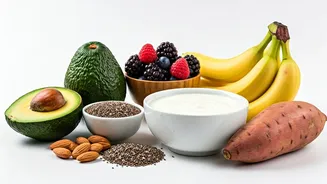Importance of Gut Health
Gut health is fundamental to overall wellness, often playing a pivotal role in not just digestion, but also in immunity and mental health. A balanced gut
microbiota, comprising a diverse range of microorganisms, is essential for optimal digestive function. These microorganisms facilitate the breakdown of food, absorption of nutrients, and synthesis of essential vitamins. Furthermore, a healthy gut contributes significantly to the immune system by forming a barrier against harmful pathogens and supporting the production of antibodies. The gut-brain connection also highlights the impact of gut health on mental well-being, where a healthy gut contributes to the regulation of mood and cognitive functions. Neglecting gut health can lead to various digestive disorders, including irritable bowel syndrome (IBS), inflammatory bowel disease (IBD), and a range of other chronic conditions.
Fiber-Rich Foods
Fiber is a cornerstone of a healthy digestive system, acting as the primary fuel for the beneficial bacteria residing in the gut. The consumption of sufficient fiber promotes regular bowel movements and prevents constipation. Dietary fiber can be categorized into two main types: soluble and insoluble. Soluble fiber dissolves in water, forming a gel-like substance that aids in slowing down digestion and regulating blood sugar levels. Good sources of soluble fiber include oats, beans, and apples. Insoluble fiber, on the other hand, does not dissolve and adds bulk to the stool, facilitating easier and more regular bowel movements. This type of fiber can be found in whole grains, vegetables, and nuts. Including a variety of fiber-rich foods in the diet is therefore essential for maintaining optimal digestive function and preventing common digestive issues.
Probiotic Powerhouses
Probiotics, live microorganisms that offer health benefits when consumed, are crucial for balancing the gut microbiome. They replenish and support beneficial bacteria in the gut, thereby enhancing digestive health and potentially alleviating symptoms of various digestive disorders. Foods such as yogurt, kefir, and fermented vegetables, like sauerkraut and kimchi, are rich sources of probiotics. The inclusion of probiotic-rich foods in the diet can help improve digestion, strengthen the immune system, and reduce inflammation. For those who find it challenging to consume sufficient amounts of probiotic-rich foods, probiotic supplements are a viable alternative. However, it's always best to consult with a healthcare provider before starting any new supplement regimen, including probiotics, to determine the appropriate dosage and potential interactions with any existing medications or health conditions.
Fermented Foods Benefits
Fermented foods, created through the process of lacto-fermentation, are abundant in probiotics and prebiotics, further contributing to gut health. These foods support the growth of beneficial bacteria, which aids digestion, nutrient absorption, and immune function. The probiotics found in fermented foods help to outcompete harmful bacteria and maintain a balanced gut environment. Beyond probiotics, fermented foods often offer an array of additional health benefits, like improved nutrient bioavailability and anti-inflammatory properties. Examples of fermented foods include yogurt, kefir, sauerkraut, kimchi, and kombucha. Regular consumption of fermented foods can promote a healthier digestive system and contribute to overall well-being. However, individuals with certain medical conditions should consume fermented foods in moderation and consult a healthcare professional, especially if they are sensitive to histamine or have specific dietary restrictions.
Healthy Fats for Digestion
Healthy fats, primarily monounsaturated and polyunsaturated fats, are essential for various bodily functions, including promoting gut health. These fats aid in the absorption of fat-soluble vitamins and support the production of bile, which is essential for digesting fats. Additionally, they help to reduce inflammation throughout the body, including the gut. Sources of healthy fats include avocados, olive oil, nuts, seeds, and fatty fish. These fats provide essential fatty acids, which are crucial for maintaining the gut lining's integrity, ensuring optimal digestive function, and mitigating the effects of digestive disorders. Including a balanced intake of healthy fats as part of a nutritious diet is critical for achieving and maintaining a healthy gut, while also contributing to overall health and well-being. Limiting the intake of saturated and trans fats is equally vital for maintaining a healthy digestive system.
Hydration’s Gut Role
Adequate hydration is a fundamental aspect of digestive health, playing a crucial role in the movement of food through the digestive tract and the absorption of nutrients. Water helps to soften stool, making it easier to pass and preventing constipation. It is also essential for maintaining the balance of the gut microbiome, as it creates an optimal environment for beneficial bacteria to flourish. Proper hydration ensures that digestive enzymes can function effectively and break down food efficiently. It also helps to prevent bloating, gas, and other digestive discomforts. Therefore, drinking sufficient amounts of water throughout the day is crucial for supporting a healthy digestive system. The recommended daily water intake may vary based on individual needs and activity levels. However, drinking water frequently, alongside consumption of other hydrating beverages like herbal teas, can substantially promote gut health and overall wellness.
Ginger's Digestive Aid
Ginger, a spice renowned for its culinary and medicinal properties, has a long history of use for alleviating digestive issues. It contains compounds that can reduce inflammation, relieve nausea, and speed up the movement of food through the gastrointestinal tract. Ginger can be particularly effective in addressing symptoms such as bloating, indigestion, and gas. It stimulates the production of digestive enzymes and bile, which facilitates the breakdown of food. Ginger also acts as an anti-inflammatory agent, soothing the gut lining and reducing irritation. Whether consumed fresh, dried, or in the form of tea or supplements, ginger can be a useful tool for supporting a healthy digestive system. Its natural properties make it a viable, gentle approach for managing and alleviating a range of digestive problems and contributing to overall gut health.
Mindful Eating Habits
Practicing mindful eating habits can significantly enhance digestive health by focusing on the process of eating rather than the content. This involves paying close attention to the sensory aspects of food, such as its taste, smell, and texture, and being aware of the body's hunger and fullness cues. Mindful eating encourages slow eating, which helps in better digestion as it allows the body to signal when it is full. This also allows for the effective breakdown of food. Taking smaller bites and chewing food thoroughly can reduce the workload on the digestive system and improve nutrient absorption. Mindful eating also involves creating a calm and relaxed environment for meals, reducing stress, and avoiding distractions such as electronic devices. Regularly practicing these habits can help improve digestion, reduce digestive discomfort, and promote a healthier relationship with food.















